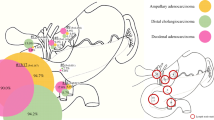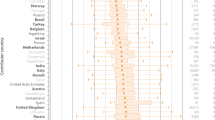Abstract
Aims
To study whether insulin resistance accelerates the development and/or the progression of pancreatic adenocarcinoma (PDAC), we hypothesized that patients with insulin resistance, compared with those without insulin resistance, show: (1) a younger age and more advanced PDAC stage at diagnosis and (2) a shorter disease-free and overall survival after PDAC diagnosis.
Methods
Prospective observational study of patients admitted to a referral center for pancreatic disease. Insulin resistance was defined as a HOMA-IR value greater than the 66th percentile value of the patients included in this study. Survival was estimated according to Kaplan–Meier and by Cox regression.
Results
Of 296 patients with PDAC, 99 (33 %) met criteria for being classified as insulin resistant at diagnosis. Median follow-up time after diagnosis was 5.27 ± 0.23 years. Patients with insulin resistance received a diagnosis of PDAC at a similar age compared to patients without insulin resistance (67.1 ± 9 vs. 66.8 ± 10 years, p = 0.68), but were more likely to have a cancer stage ≥3 (23.2 vs. 14.2 %, p = 0.053) and a residual disease after surgery (R1 56.4 vs. 38 %; p = 0.007). The median overall survival was 1.3 ± 0.14 and 1.79 ± 0.11 years for the patients with and without insulin resistance, respectively (p = 0.016). Results did not change when patients with diabetes at PDAC diagnosis were excluded from the analysis. Multivariate analysis showed that insulin resistance was independently associated with overall survival.
Conclusions
Insulin resistance is associated with the aggressiveness of PDAC.


Similar content being viewed by others
Abbreviations
- DM:
-
Diabetes mellitus
- FPG:
-
Fasting plasma glucose
- GNRI:
-
Geriatric Nutritional Risk Index
- IR:
-
Insulin receptor
- IQR:
-
Interquartile range
- LMR:
-
Lymphocyte-to-monocyte ratio
- NLR:
-
Neutrophil-to-lymphocyte ratio
- PDAC:
-
Pancreatic ductal adenocarcinoma
- PLR:
-
Platelet-to-lymphocyte ratio
- PNI:
-
Onodera’s prognostic nutrition index
References
Vigneri P, Frasca F, Sciacca L, Pandini G, Vigneri R (2009) Diabetes and cancer. Endocr Relat Cancer 16:1103–1123
Tsilidis KK, Kasimis JC, Lopez DS, Ntzani EE, Ioannidis JP (2015) Type 2 diabetes and cancer: umbrella review of meta-analyses of observational studies. BMJ 350:g7607
Carstensen B, Read SH, Friis S et al (2016) Cancer incidence in persons with type 1 diabetes: a five-country study of 9000 cancers in type 1 diabetic individuals. Diabetologia 59:980–988
Pannala R, Basu A, Petersen GM, Chari ST (2009) New-onset diabetes: a potential clue to the early diagnosis of pancreatic cancer. Lancet Oncol 10:88–95
Sah RP, Nagpal SJ, Mukhopadhyay D, Chari ST (2013) New insights into pancreatic cancer-induced paraneoplastic diabetes. Nat Rev Gastroenterol Hepatol 10:423–433
Illes D, Terzin V, Holzinger G et al (2016) New-onset type 2 diabetes mellitus—a high-risk group suitable for the screening of pancreatic cancer? Pancreatology 16:266–271
Pezzilli R, Pagano N (2013) Is diabetes mellitus a risk factor for pancreatic cancer? World J Gastroenterol 19:4861–4866
Hart PA, Chari ST (2013) Diabetes mellitus and pancreatic cancer: why the association matters? Pancreas 42:1207–1209
Elena JW, Steplowski E, Yu K et al (2013) Diabetes and risk of pancreatic cancer: a pooled analysis from the pancreatic cancer cohort consortium. Cancer Causes Control 24:13–25
Huxley R, Ansary-Moghaddam A, Berrington de Gonzalez A, Barzi F, Woodward M (2005) Type-II diabetes and pancreatic cancer: a meta-analysis of 36 studies. Br J Cancer 92:2076–2083
Song S, Wang B, Zhang X et al (2015) Long-term diabetes mellitus is associated with an increased risk of pancreatic cancer: a meta-analysis. PLoS One 10:e0134321
Ben Q, Xu M, Ning X et al (2011) Diabetes mellitus and risk of pancreatic cancer: a meta-analysis of cohort studies. Eur J Cancer 47:1928–1937
Jee SH, Ohrr H, Sull JW, Yun JE, Ji M, Samet JM (2005) Fasting serum glucose level and cancer risk in Korean men and women. JAMA 293:194–202
Gapstur SM, Gann PH, Lowe W, Liu K, Colangelo L, Dyer A (2000) Abnormal glucose metabolism and pancreatic cancer mortality. JAMA 283:2552–2558
Stolzenberg-Solomon RZ, Graubard BI, Chari S et al (2005) Insulin, glucose, insulin resistance, and pancreatic cancer in male smokers. JAMA 294:2872–2878
Bosetti C, Rosato V, Li D et al (2014) Diabetes, antidiabetic medications, and pancreatic cancer risk: an analysis from the International pancreatic cancer case–control consortium. Ann Oncol 25:2065–2072
Chari ST, Leibson CL, Rabe KG et al (2008) Pancreatic cancer-associated diabetes mellitus: prevalence and temporal association with diagnosis of cancer. Gastroenterology 134:95–101
Pannala R, Leibson CL, Rabe KG et al (2009) Temporal association of changes in fasting blood glucose and body mass index with diagnosis of pancreatic cancer. Am J Gastroenterol 104:2318–2325
Andersen DK, Andren-Sandberg A, Duell EJ et al (2013) Pancreatitis-diabetes-pancreatic cancer: summary of an NIDDK-NCI workshop. Pancreas 42:1227–1237
Sousa CM, Kimmelman AC (2014) The complex landscape of pancreatic cancer metabolism. Carcinogenesis 35:1441–1450
Zechner D, Radecke T, Amme J et al (2015) Impact of diabetes type II and chronic inflammation on pancreatic cancer. BMC Cancer 15:51
Trajkovic-Arsic M, Kalideris E, Siveke JT (2013) The role of insulin and IGF system in pancreatic cancer. J Mol Endocrinol 50:R67–R74
Valsecchi ME, McDonald M, Brody JR et al (2012) Epidermal growth factor receptor and insulinlike growth factor 1 receptor expression predict poor survival in pancreatic ductal adenocarcinoma. Cancer 118:3484–3493
Fisher WE, Boros LG, Schirmer WJ (1996) Insulin promotes pancreatic cancer: evidence for endocrine influence on exocrine pancreatic tumors. J Surg Res 63:310–313
Arcidiacono B, Iiritano S, Nocera A et al (2012) Insulin resistance and cancer risk: an overview of the pathogenetic mechanisms. Exp Diabetes Res 2012:789174
Braun S, Bitton-Worms K, LeRoith D (2011) The link between the metabolic syndrome and cancer. Int J Biol Sci 7:1003–1015
Cohen DH, LeRoith D (2012) Obesity, type 2 diabetes, and cancer: the insulin and IGF connection. Endocr Relat Cancer 19:F27–F45
Kaklamani VG, Linos A, Kaklamani E, Markaki I, Koumantaki Y, Mantzoros CS (1999) Dietary fat and carbohydrates are independently associated with circulating insulin-like growth factor 1 and insulin-like growth factor-binding protein 3 concentrations in healthy adults. J Clin Oncol 17:3291–3298
Kaklamani VG, Linos A, Kaklamani E, Markaki I, Mantzoros C (1999) Age, sex, and smoking are predictors of circulating insulin-like growth factor 1 and insulin-like growth factor-binding protein 3. J Clin Oncol 17:813–817
Balzano G, Dugnani E, Pasquale V et al (2014) Clinical signature and pathogenetic factors of diabetes associated with pancreas disease (T3cDM): a prospective observational study in surgical patients. Acta Diabetol 51:801–811
Wallace TM, Levy JC, Matthews DR (2004) Use and abuse of HOMA modeling. Diabetes Care 27:1487–1495
Levey AS, Bosch JP, Lewis JB, Greene T, Rogers N, Roth D (1999) A more accurate method to estimate glomerular filtration rate from serum creatinine: a new prediction equation. Modification of diet in renal disease study group. Ann Intern Med 130:461–470
Templeton AJ, McNamara MG, Seruga B et al (2014) Prognostic role of neutrophil-to-lymphocyte ratio in solid tumors: a systematic review and meta-analysis. J Natl Cancer Inst 106:dju124
Ni XJ, Zhang XL, Ou-Yang QW et al (2014) An elevated peripheral blood lymphocyte-to-monocyte ratio predicts favorable response and prognosis in locally advanced breast cancer following neoadjuvant chemotherapy. PLoS One 9:e111886
Kanda M, Fujii T, Kodera Y, Nagai S, Takeda S, Nakao A (2011) Nutritional predictors of postoperative outcome in pancreatic cancer. Br J Surg 98:268–274
Cereda E, Pedrolli C (2009) The Geriatric Nutritional Risk Index. Curr Opin Clin Nutr Metab care 12:1–7
Grote VA, Rohrmann S, Nieters A et al (2011) Diabetes mellitus, glycated haemoglobin and C-peptide levels in relation to pancreatic cancer risk: a study within the European Prospective Investigation into Cancer and Nutrition (EPIC) cohort. Diabetologia 54:3037–3046
Chari ST, Zapiach M, Yadav D, Rizza RA (2005) Beta-cell function and insulin resistance evaluated by HOMA in pancreatic cancer subjects with varying degrees of glucose intolerance. Pancreatology 5:229–233
Jiao L, Weinstein SJ, Albanes D et al (2011) Evidence that serum levels of the soluble receptor for advanced glycation end products are inversely associated with pancreatic cancer risk: a prospective study. Cancer Res 71:3582–3589
Michaud DS, Wolpin B, Giovannucci E et al (2007) Prediagnostic plasma C-peptide and pancreatic cancer risk in men and women. Cancer Epidemiol Biomark Prev 16:2101–2109
Wolpin BM, Bao Y, Qian ZR et al (2013) Hyperglycemia, insulin resistance, impaired pancreatic beta-cell function, and risk of pancreatic cancer. J Natl Cancer Inst 105:1027–1035
van de Poll-Franse LV, Houterman S, Janssen-Heijnen ML, Dercksen MW, Coebergh JW, Haak HR (2007) Less aggressive treatment and worse overall survival in cancer patients with diabetes: a large population based analysis. Int J Cancer 120:1986–1992
Alberti KG, Zimmet PZ (1998) Definition, diagnosis and classification of diabetes mellitus and its complications. Part 1: diagnosis and classification of diabetes mellitus provisional report of a WHO consultation. Diabet Med 15:539–553
Tang Q, Li X, Song P, Xu L (2016) Optimal cut-off values for the homeostasis model assessment of insulin resistance (HOMA-IR) and pre-diabetes screening: developments in research and prospects for the future. Drug Discov Ther 9:380–385
Perseghin G, Calori G, Lattuada G et al (2012) Insulin resistance/hyperinsulinemia and cancer mortality: the Cremona study at the 15th year of follow-up. Acta Diabetol 49:421–428
Acknowledgments
Funding
This study was supported by the Associazione Italiana per la Ricerca sul Cancro (AIRC, bando 5 x 1,000 N_12182 and Progetto IGN_ 11783).
Author contributions
G.B., F.A., G.D.T. and G.P. enrolled and managed the patients. A.G., E.D., V.P., D.L., C.D. and M.R. researched data and managed the patients during follow-up. M.S., E.B. and M.F. reviewed/edited manuscript and contributed to the discussion. LP developed the concept, designed the study, wrote the manuscript, promoted the study and researched data. The name of the guarantor for this study is Lorenzo Piemonti.
Author information
Authors and Affiliations
Corresponding author
Ethics declarations
Conflict of interest
All the authors declare that have no conflict of interest to disclose.
Ethical standard
This study has been performed in accordance with the ethical standards of San Raffaele Scientific Institute Ethics Committee and with the Helsinki Declaration and its later amendments.
Human and animal rights
All procedures were in accordance with the ethical standards of the responsible committee on human experimentation (institutional and national) and with the Helsinki Declaration of 1975, as revised in 2008.
Informed consent
Informed consent was obtained from all patients prior to be included in the study.
Additional information
Managed by Antonio Secchi.
Erica Dugnani and Gianpaolo Balzano equally contributed to this manuscript.
Rights and permissions
About this article
Cite this article
Dugnani, E., Balzano, G., Pasquale, V. et al. Insulin resistance is associated with the aggressiveness of pancreatic ductal carcinoma. Acta Diabetol 53, 945–956 (2016). https://doi.org/10.1007/s00592-016-0893-6
Received:
Accepted:
Published:
Issue Date:
DOI: https://doi.org/10.1007/s00592-016-0893-6




